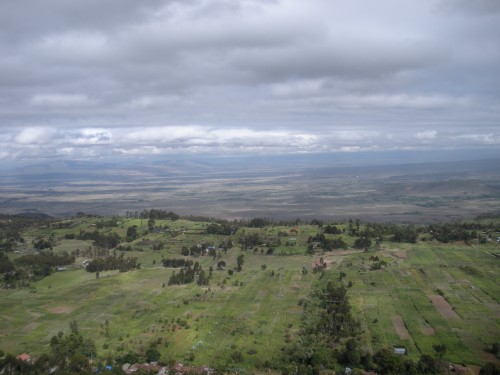FAQ: Evolution and the Fall of Man
If you believe in evolution completely, then how do you reconcile it with the account of the fall of man?
First, I believe in evolution because nature testifies that it's true. At that point, I have no choice but seek God about how to reconcile nature and the Scriptures.
I do not believe that God has ever wanted us to be people of a book. It was the old covenant that was written down with pen and paper. The new covenant, according to the Bible, would be written on tablets of flesh. As Paul put it, "We are able ministers of the new covenant, not of the letter, but of the Spirit, because the letter kills, but the Spirit gives life" (2 Cor. 3:6).
In another place, he said, "The kingdom of God does not consist of words, but of power" (1 Cor. 4:20)
I don't like the way modern Christianity exalts the Bible. I believe that the Scriptures are inspired by God, but I do not believe that we are supposed to be Bible followers. We are supposed to be Spirit followers—together, for the Scriptures say that the church is the pillar and support of the truth (1 Tim. 3:15). Individuals are prone to excesses, and they can be led astray. If you think you have revelation from God, it needs to be tested in the church. As Paul says, "Let the prophets speak, two or at most three, and let the others judge" (1 Cor. 14:29).
The Scriptures were given to equip us for good works (2 Tim. 3:17), not to be a source of doctrinal controversy (Rom. 14:1; 1 Tim. 6:4-5). The early churches said that the apostles had given them a "rule of faith," which was the basic truths they had to keep. Today we would call it a "statement of faith." Everything else was debatable.
Genesis, Evolution, and the Fall of Man
So, that all said, here's how I see Genesis, evolution, and the fall of man ...
 Is this the Garden of Eden?
Is this the Garden of Eden?The Great Rift Valley between Nairobi and Nakuru in Kenya
I believe in a literal Adam, in the sense that I believe that there was a first man into whom God breathed the breath of life. I do not, however, believe the account of the garden is literal. I don't believe there were two trees, a talking snake, nor a man named "Man" and a woman named "Life." I believe those are allegory.
I'm not the first to think such things. Long before evolution was an issue, Origen, an elder and the most respected Christian teacher of his day, wrote:
And who is so foolish as to suppose that God, after the manner of a husbandman, planted a paradise in Eden, towards the east, and placed in it a tree of life, visible and palpable, so that one tasting of the fruit by the bodily teeth obtained life? (De Principiis IV:1:14, c. A.D. 225)
I don't know if you realize, but "Adam" is simply the Hebrew word for man. It's used over 500 times in the Old Testament.
On the other hand, God has always picked out one individual to begin his people with. That is why I believe there was a literal Adam. At some point, God chose one Homo sapiens, breathed into his nostrils the breath of life, and he became something more than an animal. He became a living soul.
It's ironic, but science sort of bears that out. About 40,000 years ago, there was "a sudden leap in the creativity of man." No one's been able to explain it yet. There's no physical reason for the difference between Homo sapiens 60 thousand years ago and Homo sapiens 40 thousand years ago.
I think it was the advent of man as a living soul.
How do you understand the reason for sin and the need for Jesus without there being an "Adam" or literal fall of man?
Ah, now here we get to something that's really important. The things I wrote above affect and offend people, but really they're of absolutely no practical importance, no matter what Ken Ham says. People who reject the literalness of Genesis one do not reject the literalness of Matthew. Those two things do not go hand in hand as he claims.
 The heavens declare the glory of God
The heavens declare the glory of GodThis issue, however, is important.
Jesus came to earth as an "Adam"—as a man. He was the last Adam. You and I aren't supposed to be Adams anymore. We have become part of a new race, the children of God, being made new in Christ.
Was there a literal fall of man? I don't know. Maybe there was. Maybe there wasn't. What I do know is that whether it's from a specific fall of man or from evolution, man is beset by an innate nature that is divisive, selfish, and sometimes consumed with even more terrible sins (Gal. 5:19-21).
Jesus came to deliver us from our slavery and obedience to our own nature. He died so that we could be raised from mere Adams, mortal and powerless, into children of God, immortal and empowered by the Spirit.
What frustrates me is that the very same people who fret and fume because I don't take Genesis literally and because I don't think there was a literal garden and I don't know whether there was a literal fall of man—those people don't take the Gospel literally. Jesus said that we have to forsake everything and everyone, hate even our own life, and take up our cross if we want to be his disciple. If we don't do these things we cannot be his disciple (Luke 14:26-33).
Because they don't believe Jesus, the don't have the power Jesus promised. If we will leave everything, become his disciples, and join together into a new family as his disciples, then evolution wouldn't matter. Atheists would be speechless, unable to deny the power of God that overcomes sin, creates love, and binds humans together in joy, in the Spirit, and under the rule of God.
Again, whether there was a literal fall of man or whether it's just symbolic of our evolutionary natures—serving our own interests rather than the interests of others, the opposite of love—Jesus came to raise us up above our Adamic natures and make us God's children.
Jesus said some things that agree with the idea that he came to help us overcome what evolution and nature have put inside of us. As evolved creatures, our bodies are programmed for survival. We crave food, safety, and reproduction with an intensity that is difficult to overcome.
Jesus calls us to forsake our own survival. It is only those those who die who shall really live. He calls us to become part of something much greater than Adam, a life that is everlasting, rather than the temporary, physical life, lived in service to survival and self.
That will not simply happen with effort of will, at least not for most of us. The slavery to desire described in Romans 7 is real. Deliverance happens by the power of the Spirit of God, a gift purchased for us at the cross by Jesus Christ (Rom. 8:3-4).
Return to Frequently Asked Questions